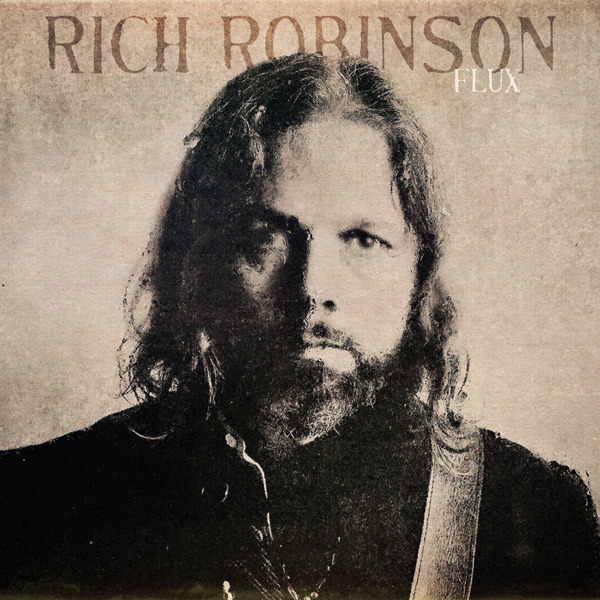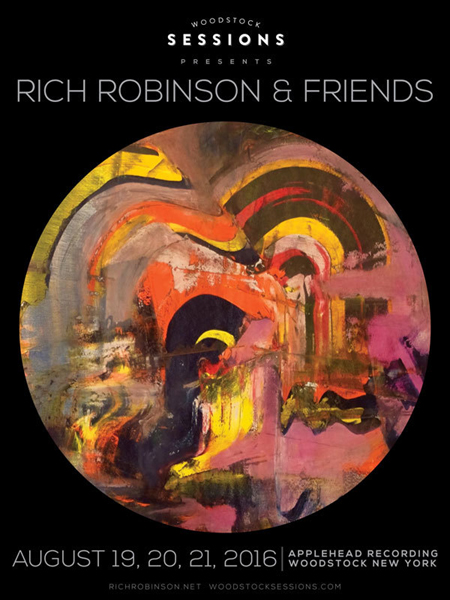Rich Robinson: Artist in _Flux_

After wrapping a tour with Bad Company earlier this summer, Rich Robinson will kick off his own solo schedule this week in support of his latest album, Flux. Robinson’s tour will include a special three night stand in Woodstock with Marc Ford and other guests. This locale is altogether fitting because it is where the Black Crowes founder and guitarist-turned-solo artist recorded his new album. While Woodstock still evokes images of three days in the mud nearly a half-century ago when half-a-million people turned up to hear Hendrix, Santana, and The Who, it’s also the former stomping ground of Dylan and The Band, and Robinson’s current space for inspiration, Applehead Studios. This is where he’s recorded Flux—an album that shines with his established southern roots, classic rock songwriting, and maybe a touch of those ghosts from 1969.
You have always seemed to be a musician who knows his history. Did Woodstock, the area, mean something to you historically, and that’s how you gravitated towards it, or was it more organic than that?
That just came across organically. I had never been to Woodstock before. In 2006 I was living in New York, in the city, and my girlfriend and I decided to drive up for a week, rent a house, get out of the city, and just hang out. I really fell in love with the place.
So you were a visitor before you ever went to work up there?
The Crowes made a couple of records up there. One of them was at this amazing place called The Lair, that’s no longer, and there was another one we did at Levon’s. The more I went up there, the more I really loved it and felt a strong connection.
How did you end up at Applehead Studio?
My friend, Joe Magistro, who’s my drummer said there was a great studio up there, and I should come try it out. I thought that’d be cool. I called him up, we set it up, it was a really great place, and I’m really happy with it. It just worked, from day one. There was history there. Rick Danko had lived on the property; the guy who built Levon’s studio built the studio; it was one thing after another.
Sounds like it inspired you.
I felt like I was able to create there in a really good way. Sometimes it’s not so obvious, but it was something that came to me pretty quickly; I like this place, I’m going to stick with it. And, I’ve made three records up there. I’ve made a lot of progress recording and writing up there, which, ultimately, is what it is all about. If it ever reaches a point where I don’t feel like I’m moving forward, I’ll switch it.
Do you think of the records you have made there as being part of a “Woodstock” period, or do each stand alone?
That’s a good question. I don’t know. Everything I do pretty much goes off of feel. To me it felt right. When it doesn’t feel right anymore, I won’t stay there.
So, it’s not the latest chapter in a series, so to speak, but more inspiration of the moment and you’re just going with it?
The inspiration of the moment and I’m just going with it.
Do you write all the time or only when there is an album to be made?
I write a lot of the time. That’s what I do. Whatever comes out of that dictates the record. I’ll write a bunch, and when it’s time to make a record is when I really throw everything on the table to see where it goes.
There’s not a lot of pre-planning because it always feels different when I’m there. Whatever I feel is where all that tends to come from, and the importance of that.
You don’t go into the studio with the album concept in mind.
I build the album once I have the songs. I use the studio to write a lot of times, especially on this record. Lyrically, I don’t do anything until I record the whole record as is; finish all the music, finish everything up. Once it’s finished, I sit with it and write lyrics to it.
How does that process affect the topics of the lyrics? A lot of Flux feels at times existential.
I listen to see what the music draws out of me. What does this make me feel? What does this bring out of me?
Does that affect your collaborators when recording, knowing they might not have a guide vocal or a melodic theme to play off of?
I’m producing the records, too, so as we’re recording it, it will be pretty obvious what certain things are called for.

You have made your solo albums stretched over ten years and across some Crowes stints. What lessons of those prior experiences did you bring to the Flux session?
I approach every record with a kind of clean slate. I just go in and see how it feels. It’s really about feeling. Whatever works or doesn’t work is pretty apparent to me.
Did the process change at all this time around?
It’s pretty much always been this way. It was different in the Crowes a little bit, in the sense that what I did was the music, that was really it. Other than that, this is how I’ve always worked.
Has touring as a solo artist informed your writing, knowing what your audiences have responded to on previous records and performances?
I can’t write for anyone but myself. Ultimately, it comes down to what sounds good to me. That’s what it’s about.
You just finished up subbing in on tour for Mick Ralphs as guitarist for Bad Company. What was that like?
It was really cool. It was great to be able to play with Simon (Kirke) and Paul (Rodgers)- excellent musicians. To me it was a fun thing to do; to go play these songs that I’ve heard my whole life. I didn’t read into it too much.
There are legions of fans of a certain age that can pretty much hear every Mick Ralphs’ riff in their heads, they’re so ubiquitous. Was that a challenge for you, to provide that familiarity for the fans?
I can only play like myself, but I went in like, my job is to play this the best I can; to give respect to these guys and these songs. It was cool to get away from something that is just yours.
Does playing with Bad Company check that off the list for you or would you do it again?
If it worked out, it would always be fun to play those songs with Paul and Simon. I would never say never. Ultimately, what I’m doing now is my stuff. It’s fulfilling. I really want people to like what I do. It’s why I make records.
Your present and future is as a solo artist.
Yes. Exactly.
Do you ever think you’ll be in a band again?
You never know. If something is cool; if something makes sense; if something was a great opportunity; if Jimmy Page wanted to put together a band with me and Paul, that could be a cool thing to do as an aside. But, this is my focus.
Okay, I can’t let that go. You, Paul Rodgers, and Jimmy Page as a cool aside? Is this something you’ve talked about doing?
No, no. I’m just thinking of really cool scenarios. Like Paul McCartney, or Neil Young- someone whom I respect greatly- I’d obviously be into that. That’d be amazing.
Your solo output enables you at this point to do a different set every night.
Exactly. We change the set every night. We have four albums, two EPs, covers, some Crowes songs. We really mix it up.
Does the on-again/off-again nature of The Black Crowes get overanalyzed because of the literal brotherhood in the band? Bands that last a long time share a brotherhood even when they are not literally related and that can be hard to maintain, too.
Literally being brothers, but also we knew (Black Crowes bassist) Sven (Pipien) when I was 15 years-old, and (drummer) Steve (Gorman) when I was 16. We played together as kids, so, yes, it does feel like a brotherhood. I’m sure there are elements of that that a lot of bands go through. We’re not unique in our bullshit. We reached a point where it’s not worth it unless the bullshit stops. Then, maybe, you never know what happens. Right now, I’m just really happy to be doing what I’m doing. I’m so happy to be playing with Sven. Marc Ford is coming out to play some shows with me in Woodstock in August. It doesn’t stop—you still play with the people that are your brothers, that you have tremendous respect for musically. We’re still valid in that sense. We’re still creative in that sense.



















